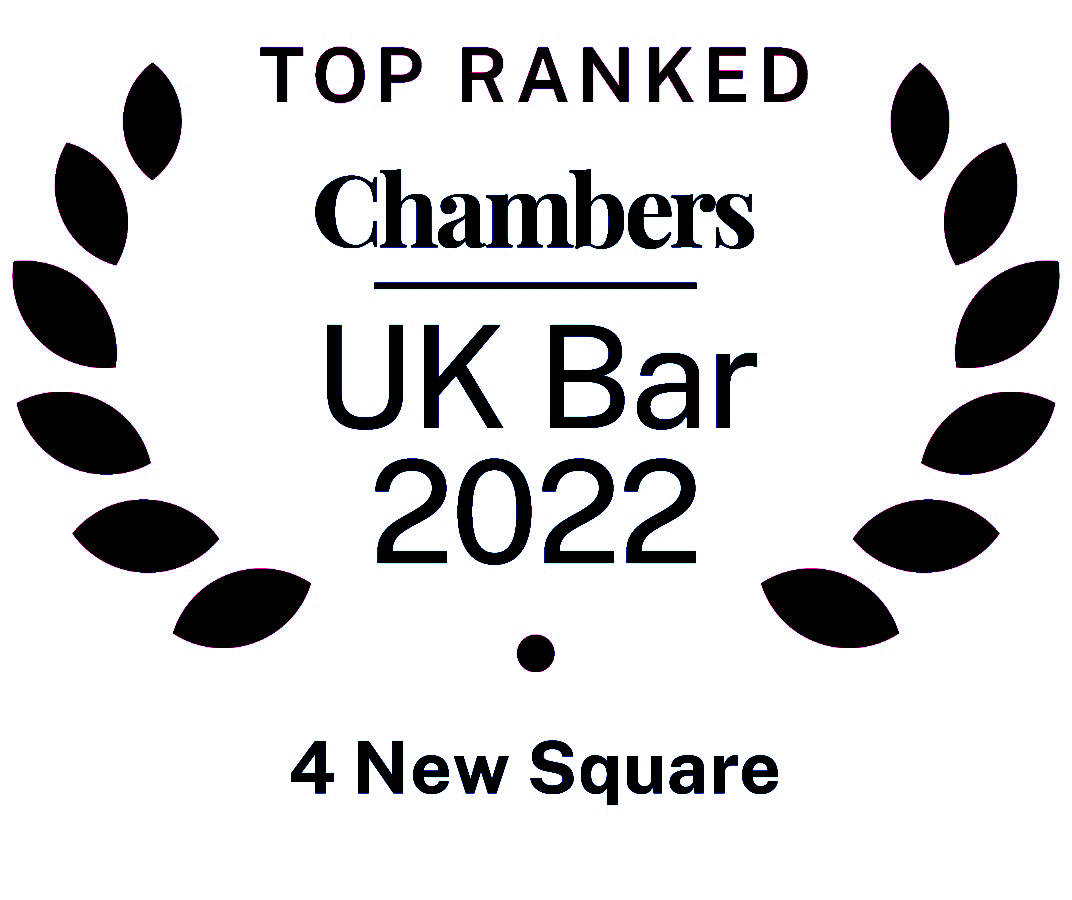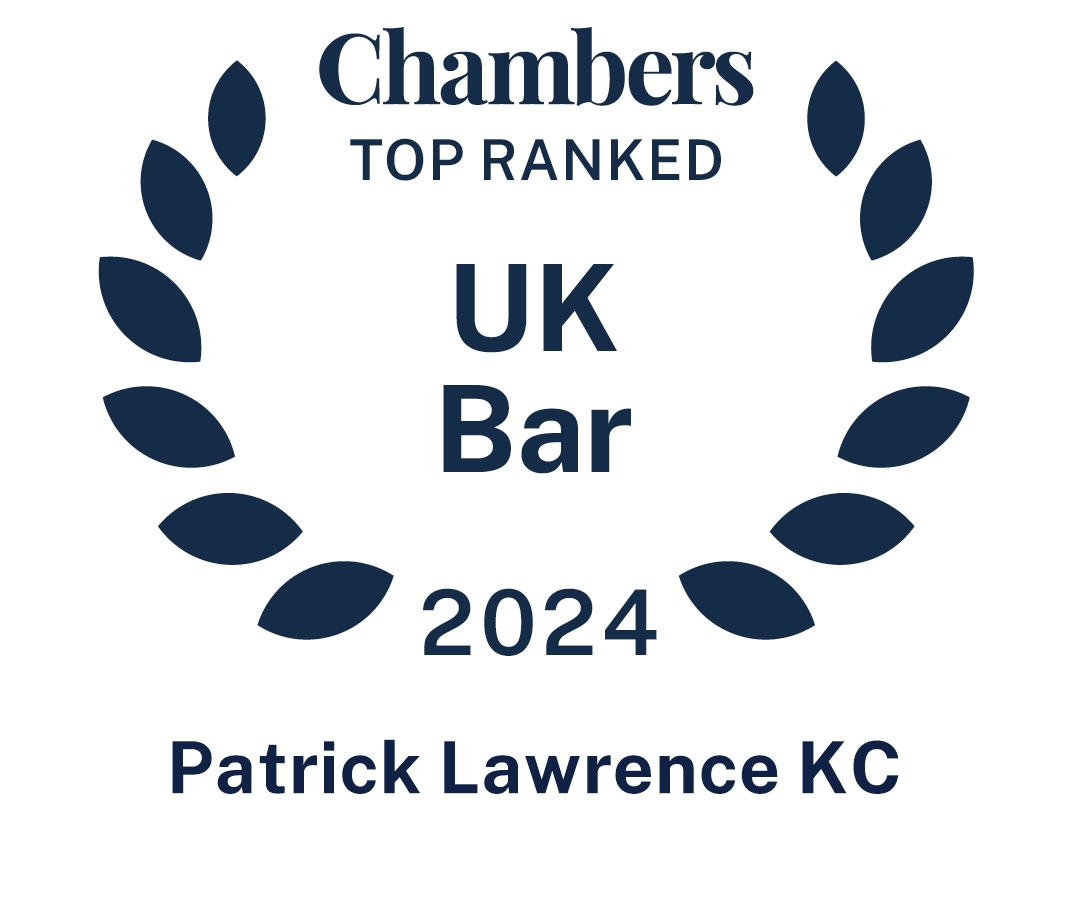Former Chambers & Partners Professional Negligence Silk of the year, Patrick has appeared in many leading cases at appellate level.
If you believe the Directories: “a wonderful advocate”, “extremely bright and very personable – a formidable opponent” [Chambers]. “He is fantastic on his feet and I have the utmost confidence in him.” “One of, if not THE best for professional negligence claims. He is calm, tactical and holds his nerve.” [Chambers] “A Rolls-Royce silk … able and approachable in equal measure, one of the most in demand professional indemnity barristers … a towering courtroom presence .. superb in complex heavyweight cases, known for razor-sharp mind and ability to take a witness apart.” [Chambers] “very charismatic and good with clients; he is able and approachable in equal measure” [Chambers]. “He is a brilliant lawyer with a real appreciation of the ‘human’ side of cases”, “a superb advocate, who always manages to engage the court and present arguments in a compelling fashion”, “highly persuasive” and “can make complicated arguments understandable” [Legal 500]. “He has a fantastic manner and outstanding judgement”, “Inspires great confidence and tackles problem with the minimum of stress” [Legal 500].
He practises principally in the commercial and company law sectors. This work fits well with his expertise in auditors’ negligence and his involvement in claims against pensions advisers, tax advisers, and other financial services professionals. He is numerate (as barristers go). He is retained in cases where effective cross-examination is considered critical. Many of his cases involve allegations of impropriety in the commercial world, and he is prepared to read closely large amounts of material in order to find out what really went on, and then – if necessary – to go to court to prove it. He has acted in many leading cases involving the development of equitable rules concerning fiduciary obligations in a commercial context, and the interplay between trust, contract, and fraud.
There is an obvious connection between his professional liability work and disciplinary proceedings involving professionals, and he has acted for complainants and respondents in relation to conduct issues concerning solicitors, barristers, accountants and surveyors. He has conducted a number of substantial hearings involving allegations of misconduct against auditors on behalf of the bodies responsible for investigating complaints against auditors in cases raising issues of public interest.
Patrick operates also in the field of public law, specialising in A1P1 cases. He appeared in the Supreme Court in UKIP v Electoral Commission, and in Court of Appeal in the leading A1P1 solar panel claims against DECC; Breyer v DECC.
He is a co-author of the chapter on solicitors’ negligence in the Lloyds looseleaf on Professional Negligence.
Click here for a Privacy Policy for Patrick Lawrence KC.
Patrick’s practice ranges widely over all forms of commercial law. He has extensive experience of all forms of arbitral process and is very familiar with the ICC Rules of Arbitration. He has acted in many construction cases, and has advanced so-called ‘black hole’ arguments as to no loss on both sides of that debate. He first argued issues of that type in the construction field, where the 19th century jurisprudence (the Albazero case, etc) has been developed in cases such as Alfred McAlpine v Panatown. He acted for the successful appellant in Titan v Colliers, a securitisation case involving ‘black hole / no loss’ arguments arising out of a complex web of assignments and trust arrangements. The Court of Appeal judgment contains the most recent appellate guidance in this area of the law. He is currently engaged in an appeal to the Privy Council from the Eastern Caribbean Court of Appeal which will require an extensive review of jurisdiction authorities, and may involve critical reconsideration of the law relating to acceptance of jurisdiction.
Patrick has appeared in a wide range of commercial contract cases, both in court and before arbitrators. He has extensive experience of the obtaining of interim remedies in the commercial context: eg. Orb ARL v Fiddler [2016] EWHC 361, in which Popplewell J, set aside freezing and search orders on the ground of non-disclosure.
Featured Commercial Cases
Patrick is frequently instructed in cases involving issues in the Chancery field; tax, trusts, company law and real property. Present and recent cases include:
Featured Commercial Chancery cases
Patrick’s familiarity with (i) claims arising out of failed litigation and (ii) insurance law has led to the development of a practice in the field of costs law. Costs cases include: IOMA Insurance v Wake Smith – failure of multiparty industrial illness litigation supported by CFA/ATE packages; 3 week trial in Mercantile Court of costs/ATE issues arising therefrom; (ii) Automotive Latch Systems v Honeywell Inc. – advising on ATE cover following failure of >$100m commercial claim giving rise to >$15m costs liabilities; (iii) Hunt v Harlock – successful appeal against a ruling that a clerical error in an ATE policy vitiated the cover and meant that the premium was irrecoverable; (iv) Astaldi SPA v [a firm of solicitors] claim by Italian construction company in respect of disbursements relating to litigation in Algeria; (v) Bamrah v Gempride – leading case on the power to disallow costs on the ground of misconduct in assessment proceedings; now a landmark judgment on appeal [2018 EWCA 1367; (vi) Warren v Hill Dickinson [2019] EWHC B1 (Costs) – a decision of Master Leonard, considering s.70(1) Solicitors Act; and ambiguities and lacunae in CPR provisions concerning interim costs certificates; (vii) Willers v Joyce [2019] EWHC 2183 – an important decision by Rose J. on an application for a non-party costs order against the lawyers acting for the unsuccessful claimant, brought on the ground that the lawyers had a direct pecuniary interest in the recovery of the main head of damage, and should accordingly be regarded as “real parties” to the litigation who were within the scope of the court’s costs jurisdiction.
“Outstanding in his advice. He’s pragmatic, client-friendly, extremely bright and persuasive.” “Great judgement and clients love him. A go-to barrister for high-value complicated claims.” “Very polished and bright. He doesn’t miss any tricks.” – Chambers & Partners, 2024
“Patrick brings a level of gravitas to any matter. He is persuasive and charming in equal measure.” – Chambers & Partners
“An intelligent barrister who is willing to spend the time required to ensure that all nuances in a case are fully explored. Has the ability to identify the core points in a complex case which need to be addressed to win the case.” – Legal 500
“He’s extremely level-headed, and has gravitas but is personable and approachable.” – Chambers and Partners
Ranked as a Leading Silk, Patrick is described as “a class act who is very user-friendly”, “very good at carrying vulnerable clients through a difficult process. He explains regulatory requirements and how best to deal with issues”, “he’s a wonderful advocate and a very bright chap”, “very bright” with a “huge ability to take in massive amounts of detail in very complex cases and make them straightforward”, “his charming and rather urbane style always goes down well”.
He has appeared for solicitors and surveyors in front of their professional disciplinary bodies on numerous occasions. In recent years he has been retained in disciplinary matters involving accountants/auditors, solicitors, barristers, a handwriting expert, a psychologist and a county councillor. He has advised on judicial review remedies in this field and has been concerned in judicial review applications against the Bar Council and the ICAEW. He is very familiar with issues arising where a complainant has delayed unreasonably before lodging the complaint. He has been frequently been retained by the JDS/ AADB/FRC (the bodies charged with investigating public interest allegations against the auditors of public companies) to conduct substantial complaints against auditors and accountants in business.
He has acted in judicial review proceedings against the ICAEW concerning a complaint against a chartered accountant (Crookenden v ICAEW); and in the first matter to go before the Disciplinary Committee of the Insolvency Practitioners Association for a number of years.
In 2020 he appeared in Gubarev, a case in which partially remote proceedings were unlawfully live streamed. The court referred the matter to the Divisional Court, where this topical area was reviewed critically by the President of the QBD. Later in the year, Patrick appeared before the Court of Criminal Appeal in the ‘Postmasters’ appeal, on behalf of counsel in relation to a complaint that disclosed documents had been provided police and press.
In 2018-19 he acted in various matters before the SDT involving allegations of dishonesty and want of integrity.
In 2016-17 he was heavily engaged in Williams v SRA, a SDT case which went to the Divisional Court, a leading case on issues relating to proof of dishonesty; the distinction between dishonesty and want of integrity; and the consequences of an omission to cross-examine.
He is currently retained in a number of cases concerning the position of professionals who provide expert and other evidence while retained on some form of contingent fee agreement.
Featured Disciplinary & Regulatory cases
Patrick’s extensive practice in this area has focused on disputes between insurer and insured concerning questions of construction, and the avoidance of policies for non-disclosure, misrepresentation and fraud. He has appeared in a number of contested trials at which the honesty of the insured has been the subject of a direct challenge. He has frequently advised on the relationship between the solicitors’ policies now written by the commercial market and the run off insurance administered by SIF; and has acted as in arbitrator in that connection. He has advised on coverage issues relating to claims arising out the Madoff fraud. In the last decade he appeared in numerous (>30) arbitrations in the field of PI cover, raising issues as to the operation and construction of the ‘Minimum Terms’; as to ‘Successor Practices’; as to the liability of insurers to indemnify in respect of issues arising out of disputes as to costs and fees; and (of course) as to notification and aggregation. He recently acted for the claimants at the trial of multi-party proceedings in the Commercial Court, involving both insurers and brokers, arising out of claims in respect of fire and business interruption cover.
“He is particularly impressive in the court room; completely unflappable.” – Legal 500
“Very charismatic and good with clients; he is able and approachable in equal measure” – Chambers & Partners
Patrick has a substantial offshore practice and has been instructed in cases in the Eastern Caribbean, Hong Kong, and Guernsey. He is currently acting in a $400m audit claim in Trinidad; commercial fraud and trusts litigation raising jurisdictional issues in the BVI, to be considered in the Privy Council; and is advising on jurisdictional issues concerned multi-party litigation in the Channel Islands. He is called to the Bar in the Eastern Caribbean.
Patrick is frequently retained in connection with claims arising out of the alleged mishandling of pension schemes; including, among others, claims concerned with defective amendments to the core scheme documents; failed equalisations; and mismanaged transfers into the PPF. He has acted both in relation to Part 8 proceedings aimed at remedying errors by means of rectification, estoppel and other equitable devices; and in the claims against advisers (pensions consultants and lawyers) that tend to follow less than wholly successful remedial action. He is very familiar with the issues that typically arise in this area; for instance, the difficulties in identifying the correct claimant and locating the real loss; long tail limitation issues involving s. 14B and the concept of a continuing duty; the capitalisation of losses founded on an outlay extending decades into the future, and the analogies that can be drawn with litigation in other areas concerning discount rates; claims for very substantial costs incurred in remedial proceedings; and the usual panoply of questions arising in relation to the tension between fairness-driven equitable principles and black letter construction of long term deeds.
Featured Pensions cases
Patrick has considerable experience of applications for judicial review arising out of his work in the disciplinary/regulatory context. He has appeared in a number of reported cases concerning the construction of statutes pursuant to s.3 of the Human Rights Act – eg. Cachia v Faluyi. In the last few years this grounding has enabled Patrick to develop his public law practice, especially in the field of political activity and the funding of political parties. In 2010 he acted in the Supreme Court for the successful appellant in R (on application of Electoral Commission) v City of Westminster Magistrates Court; UKIP as interested party [2010] UKSC 40. He acted for claimants in the claim against DECC for damages under the Human Right Act which arose out of the attempt to make retrospective changes to solar heating tariffs, the subject of the decision of the Court of Appeal at DECC v Breyer [2015] EWHC (Civ) 408, now a leading case in the jurisprudence on claims for damages for infringement of A1P1 rights.
Featured Public Law & Human Rights cases
“Patrick Lawrence remains a towering force likely to put off the opposition simply by his presence.” “He gives you a wonderfully clear, well-reasoned view on any claim you send him.” “Excellent in getting to the heart of claims and providing clear advice, analysis and drafting.” “His advocacy is fantastic.” – Chambers & Partners, 2024
“Patrick has huge experience, sees the big picture and is able to articulate the heart of the case. He is a superb advocate.” “Patrick is one of the best advocates on his feet. He is a very calm, reassuring presence.” “Patrick is an extremely experienced and knowledgeable KC. Clients adore him.” – Chambers & Partners
“He’s a fearsome courtroom performer with a Rolls-Royce mind. Someone you’d want to fight your corner in a hard case.” “If you ask him for an opinion to stand by he’ll give one, and he holds the attention of the court and intimidates the opposition with his gravitas.” “A brilliant advocate: he’s very clever, user-friendly and a good laugh. He’s a very rounded person as well as being incredibly able.” – Chambers & Partners
“Hugely intelligent and eloquent both in written and oral advocacy” – Legal 500
“His presentation style is fantastic and he’s very good at holding a room, while delivering the key message of his advice.” “He is extremely experienced and truly specialises in professional negligence. He can distil a case of a million papers down to size.” – Chambers & Partners
“He is fantastic on his feet and I have the utmost confidence in him.” “One of, if not THE best for professional negligence claims. He is calm, tactical and holds his nerve.” – Chambers & Partners
“He is particularly impressive in the court room; completely unflappable.” – Legal 500
Former Chambers & Partners Professional Negligence QC of the year (and nominated for a second time in 2017), Patrick has appeared in many leading cases at appellate level. He defended expert witness immunity in the Supreme Court in Jones v Kaney.
Patrick has extensive experience in high value audit negligence cases. Between 2016 and 2020 he acted in a $200m claim arising out of the collapse of an insurance conglomerate in the Eastern Caribbean. He is currently acting in a claim concerning self-interest conflict and the suppression of evidence of fraud in connection with the auditing of a bullion dealer in Dubai. He has conducted a number of lengthy contested cases (among them Resort Hotels, Wiggins and Mayflower) the FRC or its predecessors. He acted in audit cases arising out of the largest ever fraud on the AIM, Langbar International PLC, and arising out of the Farepak collapse (the Christmas hampers case). He has extensive knowledge of auditing and accounting standards. He has addressed a wide range of audit issues: eg. fraud, and audit response to evidence of fraud; premature or excessive recognition of revenue; allegedly inappropriate capitalisation of expenditure; quality of audit evidence; the going concern basis; the justification for the issuing of qualified and adverse audit opinions; and so on.
Patrick has acted in a number of claims against accountants that have gone to trial and to appeal. The cases have concerned tax advice; investment advice; general financial advice to private individuals and family; and a wide range of advice to corporate clients. A representative case is Little v George Little Sebire which involved defective advice on Corporation Tax and related tax avoidance issues. He appeared in Haines Watts v Thornhill, a multi party case arising out of a container leasing tax avoidance scheme involving solicitors, accountants and tax counsel. He acted in the fall-out from the failed Cabvision litigation, which itself concerned another over-ambitious tax avoidance scheme. He is currently engaged in a number of cases involving allegedly defective advice on off-shore tax avoidance structures.
His familiarity with claims against accountants fits well with claims arising out of bad investment advice. He is currently instructed on claims concerning the mis-selling of endowment mortgages; the marketing of ‘zeros’; the negligent management of a portfolio of equities (excessive weighting in technology and internet stocks); and many claims related to the aggressive marketing of supposedly tax-efficient schemes which have gone disastrously wrong.
He has acted in many claims against insurance brokers. Not many have reached court, but that may partly be because such claims tend to be rather difficult to defend on liability issues. He appeared in Jones v Environcom [2011] EWCA 1152. Kirk v Aviva and others settled shortly before trial in 2017; a fire case involving claims against insurers and brokers, and allegations of breaches of fiduciary duty arising out of undisclosed close commercial connections between broker and insurer.
Patrick has very extensive experience of all forms of litigation arising out of claims against lawyers. In the 1990s he was frequently instructed by the Solicitors Indemnity Fund in cases involving errors made (allegedly) in a very wide range of areas of legal practice. He was instructed in the managed litigation involving claims brought by the Bristol & West Building Society, which went to a 12-week trial before Chadwick J. He was subsequently instructed in further managed litigation and mediation concerning claims brought by other lenders. His involvement in the protracted duel between lenders and those who insure solicitors has left him with an understanding not only of most forms of mortgage fraud and incompetent conveyancing, but also of the increasing significance of equitable and proprietary claims in the context of professional liability and of the delicate handling required in cases containing allegations of impropriety. He acted for the defendant solicitors in Lexi v Pannone, a claim arising out of the £100m fraud perpetrated by the managing director of the claimant company which raises Stone & Rolls illegality issues; for the defendant solicitors in the case brought by Earl Spencer in relation to the conduct of divorce proceedings; and for the claimant in proceedings against the lawyers who acted in the unsuccessful Cabvision litigation. He successfully defended the Petrocapital claim, which concerned advice on convertible loan notes against the background of a boiler room scam. He acted in the managed claims concerning Right to Buy. He is currently acting in high value claims involving the conduct of big money divorce proceedings, and in multi-party pensions negligence litigation arising out of the Gleeds decision.
Patrick co-authors the section on solicitors’ negligence in the Lloyds Looseleaf on Professional Negligence.
Featured Lawyers cases
Patrick has been instructed in many cases involving allegations of negligence against those who advise pension schemes. They have concerned (among other things) failed post-Barber equalisations; variations to schemes which have been ineffective as a result of a lack of attention to the provisions governing amendment; issues as to the identity of those to whom the advisers owe duties; black hole damages points; damages issues arising in relation to entry of scheme into PPF. He has acted in a number of cases arising out of the entry (or attempted entry) of a scheme into the PPF, and has defended claims brought by the PPF in its own right. In 2017-2019 he acted in major multi-party litigation arising out of the decision of Newey J. in Gleeds Retirement Benefits Scheme [2015] Ch 212. Amending deeds were improperly executed over a period of almost 20 years. Part 8 proceedings intended to validate the deeds and make the amendments effective were largely unsuccessful. The matter was settled on appeal, on terms leaving the employer facing additional liabilities of many millions of pounds. The employer began proceedings against the negligent pension advisers, who responded by alleging that the Part 8 proceedings had been conducted negligently. The outcome was very complex litigation in which issues arose as to (among other things): the legal principles to be applied where one defendant argued that the subsequent negligence of an adviser ‘broke the chain of causation’; the legal principles to be applied where a claim for damages was founded on a liability established by a compromise; title to sue (as between pension trustees and the employer); the operation of s. 14B of the Limitation Act 1980; the quantification of the claim in respect of unintended liabilities (‘best estimate’ basis; buy-out basis; or something else?); the quantification of claims in respect of expenditure on legal costs; and the important procedural question whether negligent advisers should be joined to Part 8 proceedings designed to remedy the consequences of their negligence.
Much of Patrick’s work in the 1990s related to allegedly over-optimistic valuations. He appeared in Platform Home Loans, the leading authority on the interaction in claims against valuers of the Saamco principle and contributory negligence on the part of claimant lenders. In 2009 he acted for the claimant in McKay v Savills – a claim arising out of dishonest collusion between buyer and property professionals.
Since the market collapse in 2008-09 he has been retained in a large number of high value claims against valuers, and is very familiar with the issues that arise where claims arise out of aggressive lending practices of 2000-2008. In 2010 he appeared for the successful defendant in K/S Lincoln v CBRE [2010] EWHC 1156, a claim concerning the valuation of a £40m portfolio of hotels. The case stands as the most up-to-date authority on the “margin of error defence”. Since then, Patrick has been looking to develop the reach of that defence in cases involving residual valuations of commercial developments, where a small and permissible variation in relation to one component of the valuation can lead to the final valuation figure being ‘out’ by a very significant margin. He has also been considering the issues that arise where an employee of the claimant lender may have acted improperly in relation to the making of the loan in question, and has been exploring the ways in which evidence of an individual’s impropriety may provide a valuer with a complete defence. In 2015-19 he acted in claims involving a £1.2bn commercial portfolio valuation; a €300m portfolio of commercial properties in Benelux/Germany; a £250m commercial valuation in the Midlands; a £150m hotel portfolio valuation; among others.
He acted in Titan (Europe) 2006-3 plc v Colliers [2015] EWCA Civ 1083; the first valuer’s claim to raise issues as to title to sue in the context of securitisation. The Court of Appeal overturned the decision of Blair J (reported at [2014] EWHC 3106, (Comm)), that the defendant valuer had negligently overvalued a large commercial property in Germany, for the purpose of inclusion in a portfolio of loans to be securitised by Credit Suisse. For a more detailed note on this case, written by the instructed counsel, please click here.
Featured Surveyors & Lawyers cases
“He has a fantastic manner and outstanding judgement” – Legal 500
Patrick Lawrence comes from a racing family. He has conducted a number of hearings before the BHA’s Disciplinary Panel, and for a period sat on the Panel as one of its three legally qualified members. He has acted in many cases concerning sports spread betting, and has drafted the standard terms used by the members of the Sports Spread Betting Association. Cases include: (i) McGarel Groves v Glyn; action arising out of death of international dressage horse; (ii) BHA v Warwick Racecourse; 2day hearing arising out of abandonment of racing at Warwick; (iii) BHA v Wigham & MacKay; 2 day hearing into Rule 155/157 complaints.
He appeared for the successful defendant in Venturi v Coral Eurobet [2012] EWHC 2139, a claim brought by an internet gambler who alleged that he had turned 20 euros into 700,000 euros in 2 hours.
In 2011 he obtained an injunction on the morning of Derby day to restrain Kieren Fallon from riding in the Derby; Araci v Fallon [2011] EWCA Civ 668.
In 2017-19 he acted in a number of claims brought against gambling operators by parties who claimed that their money had been used, and lost, by a gambler who should not have been allowed to bet. The claims involved the development of equitable principles to circumvent the obstacles created by the decision in Calvert v William Hill.
Featured Sports cases

Patrick Lawrence KC, Carl Troman and Diarmuid Laffan succeed in the Court…

63 members of 4 New Square Chambers have been ranked in the…



Legal 500“Patrick gives you the feeling of a really top class service in every aspect of his work, including dealings with the client and other parties. Having him on board gives you the winning edge.”
Chambers & Partners“A towering courtroom presence ... superb in heavyweight cases, known for razor-sharp mind and ability to take a witness apart”
Chambers & Partners“A highly persuasive advocate who can make complicated arguments understandable.”
Legal 500“He is a brilliant lawyer with a real appreciation of the “human” side of cases.”
Legal 500“A superb advocate, who always manages to engage the court and present arguments in a compelling fashion.”
Christ Church, Oxford, 1st class degree in P.P.E
4 New Square
Lincoln's Inn
London, WC2A 3RJ
BARRISTERS REGULATED BY
THE BAR STANDARDS BOARD
Accessibility | Cookies | Disclaimer | Equality & Diversity | Privacy Policy | © 4 New Square Chambers – All Rights Reserved | Site by Tela.
| Cookie | Duration | Description |
|---|---|---|
| cookielawinfo-checkbox-advertisement | 1 year | Set by the GDPR Cookie Consent plugin, this cookie is used to record the user consent for the cookies in the "Advertisement" category . |
| cookielawinfo-checkbox-analytics | 11 months | This cookie is set by GDPR Cookie Consent plugin. The cookie is used to store the user consent for the cookies in the category "Analytics". |
| cookielawinfo-checkbox-functional | 11 months | The cookie is set by GDPR cookie consent to record the user consent for the cookies in the category "Functional". |
| cookielawinfo-checkbox-necessary | 11 months | This cookie is set by GDPR Cookie Consent plugin. The cookies is used to store the user consent for the cookies in the category "Necessary". |
| cookielawinfo-checkbox-others | 11 months | This cookie is set by GDPR Cookie Consent plugin. The cookie is used to store the user consent for the cookies in the category "Other. |
| cookielawinfo-checkbox-performance | 11 months | This cookie is set by GDPR Cookie Consent plugin. The cookie is used to store the user consent for the cookies in the category "Performance". |
| CookieLawInfoConsent | 1 year | Records the default button state of the corresponding category & the status of CCPA. It works only in coordination with the primary cookie. |
| viewed_cookie_policy | 11 months | The cookie is set by the GDPR Cookie Consent plugin and is used to store whether or not user has consented to the use of cookies. It does not store any personal data. |
| Cookie | Duration | Description |
|---|---|---|
| wp_law_pdfbuilder_bespoke | 1 Year | Used for the portfolio builder |
| wp_law_pdfbuilder_list | 1 Year | Used for the portfolio builder |
| Cookie | Duration | Description |
|---|---|---|
| _ga | 2 years | The _ga cookie, installed by Google Analytics, calculates visitor, session and campaign data and also keeps track of site usage for the site's analytics report. The cookie stores information anonymously and assigns a randomly generated number to recognize unique visitors. |
| _ga_DJZVZPQ3PF | 2 years | This cookie is installed by Google Analytics. |
| _gat_gtag_UA_196640177_1 | 1 minute | Set by Google to distinguish users. |
| _gid | 1 day | Installed by Google Analytics, _gid cookie stores information on how visitors use a website, while also creating an analytics report of the website's performance. Some of the data that are collected include the number of visitors, their source, and the pages they visit anonymously. |
Select the expertise that you would like to download or add to the portfolio
| Title | Type | CV |
|---|
Click here to share this shortlist.
(It will expire after 30 days.)
Need more information about the above People and Expertise?
Talk to one of our clerks: +44 (0)20 7822 2000
